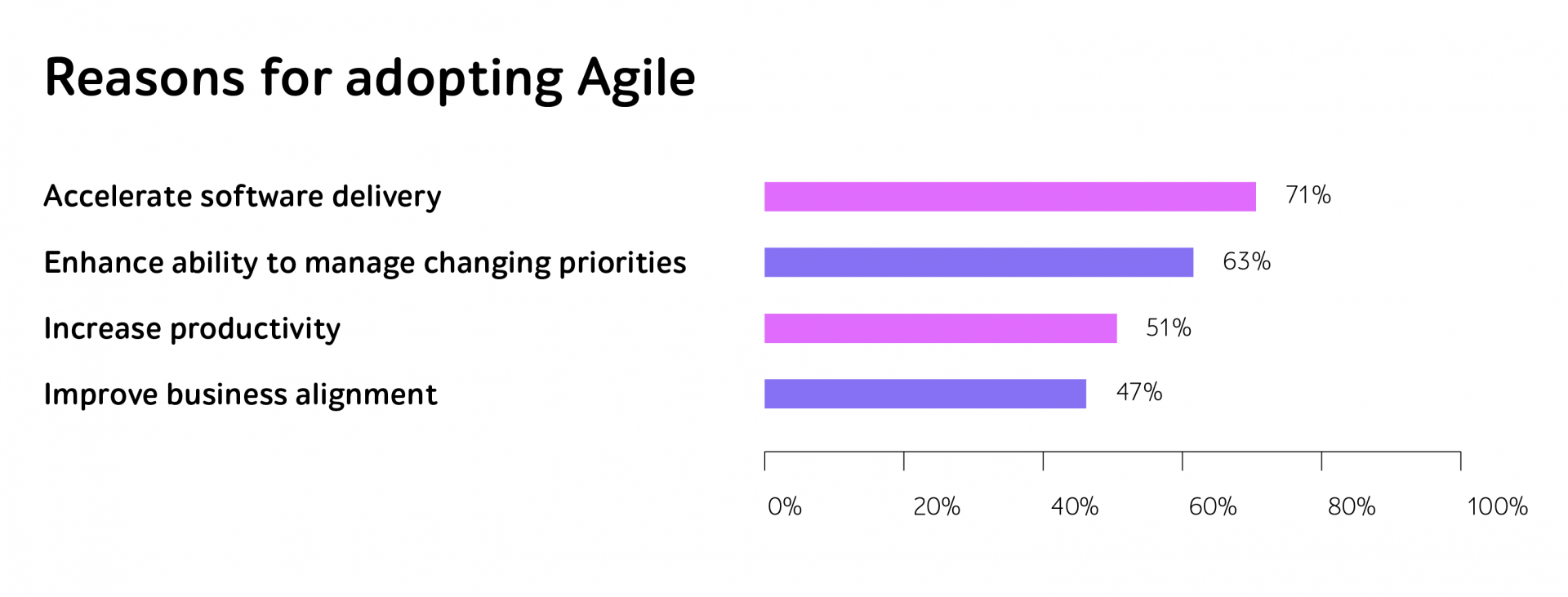
A clear view of smart team scalability
Within the evolving IT market, the demand for high-quality software is boosting day by day, with companies improving their products continuously. By adding new functionality and upgrading the developed one, their intentions are around to meet the end-user expectations.
This is where the need to ramp up the team, a QA group being no exception, is growing by leaps and bounds to help them stay ahead of the competitors.
Researchers from the University of California at Berkeley and Stanford found that 90% of young businesses fail because of premature expansion, and this is where it becomes clear that a prepared scaling plan doesn’t necessarily mean organizations attain planned outcomes.
By leveraging smart scalability based on agile methodologies and scaling up and down on request, businesses are more likely to derive desired results. The World Quality Report 2019-2020 indicates 95% of respondents use agile to some extent.
The Agile approach is more typical for small teams. But what if the promptly changing market and the need to offer truly high-quality IT solutions force to accelerate delivery time and enlarge the project? In the article, we discuss how to effectively scale a QA team and be confident in releasing top-notch apps meeting tight deadlines.
Reasons for scaling QA team
Global digitalization has become a clue for transforming internal processes. The unstable situation also paved the way for the rapid transition to a new norm, when people massively migrated to the online space within moving limits.
In such conditions, companies have tested their strength and how deeply their business operations were shocked. However, most of them were not prepared for this and faced a number of hindrances: decreased customer satisfaction, fallen market share, reduced revenue, and much more.
To bolster their competitiveness, organizations need to speed up time to market. How to do this in unprecedented circumstances? Salvage the situation with Agile. Here are the top 4 reasons for implementing it.

When it is not enough to be ahead of the competitors, adapting not only at the team level but also within the entire organization can be a way out. Based on smart scaling, SAFe is designed to conduct large transformational programs being about the equality of team members and the timely exchange of information between numerous participants using agile. Therefore, every employee understands the business goals and knows how to achieve them.
Smart scalability addresses the challenge
Applying for a sage extension, companies can change the number of project participants on request at short notice. Hinging on the business goals, the team might be scaled up and down.
The mounting process also involves the division into small groups, where effective communication is a silver bullet. Due to the desire to reach planned outcomes laying at the heart of the approach, employees re-image the mindset and work cohesively with each other.
Having united all the departments and teams with one management system, productivity increases. Project participants know their responsibilities, roles, and whom to contact in case of an emergency. They do understand their tasks and project objectives better, which means reducing downtime.
Moreover, employees’ accountability and independence in decision-making are evolving. There is no more need to regularly contact managers with uncomplicated issues that allow specialists to use their knowledge and experience and unleash their potential.
How to expand a QA team successfully?
Here’s what a1qa’s experts recommend to increase the number of team members effectively.
Compose a plan
A plan should be designed at the very start when recruiting employees. As the team grows, it is necessary to continuously develop the right strategy that will suit the current state. The scaling plan covers all activities on the project, from the technical aspects (tools and infrastructure) to the teams and resource management.
If you have a range of urgent and high-priority tasks to focus on, you can onboard a QA consultant who is up to analyze the current situation on the project and make a reliable plan for the transition to new practices supporting you in achieving your business outcomes.
Prioritize
Defined business goals streamline attracting specialists with an adequate skillset, as expertise and technical knowledge for productive work have already been specified. It is better to set several ultimate goals to be sure tasks are prioritized, and activities are consistent with the plan. An example to consider is: if the project’s aim is to accelerate time to market, you need to onboard test automation specialists to optimize routine checks, reducing the iteration time.
Onboard specialists with right skills
The software quality and success largely depend on the team. It is crucial to recruit QA talents with the appropriate skills not only at the start of the project but also when an expansion is necessary.
It is a common situation when the internal crew is not enough to scale, and organizations turn to outsourcing. It happened when the customer, a global provider of telecom IT solutions, entrusted the a1qa’s team with testing three large software packages. The scope of the project was regularly changing that caused the QA group ramp-up.
Considering the workload size, a1qa attracted additional QA specialists and also reduced the QA squad upon request.
Thanks to the timely knowledge transfer and task monitoring, the QA expansion was effective.
Monitor progress and results
By tracking all the parameters, including success metrics, you get a birds-eye view of the team’s structure, its productivity, and growth in the future. Otherwise, it is more likely to miss the scaling time or which area needs it.
Moreover, controlling progress on the level of an employee is an essential point. KPIs allow specialists to develop themselves and have a better understanding of business aspirations.
Care and interest in the progress of all project participants can ensure productive scaling, continuous interaction, and working as a single system.
All things considered
Highly competitive IT space forces companies to briskly scale project members, including those assuring quality.
But how to expand physical horizons and maintain high productivity? Smart team scalability is a way out. Based on agile methodologies, the approach contributes to faster time to market and adaptability within the entire organization.
Bringing on the right skillset and a clear strategy at the start, task prioritization, and setting KPIs can fuel the growth meeting all desired outcomes.
Need support in scaling your QA team? Reach out to us to get help from a1qa’s experts.









